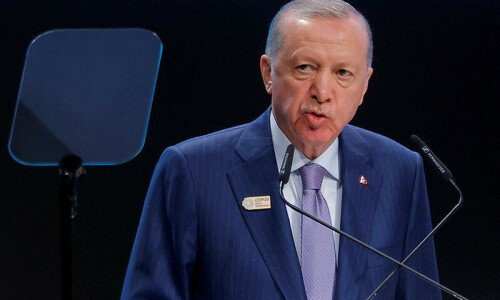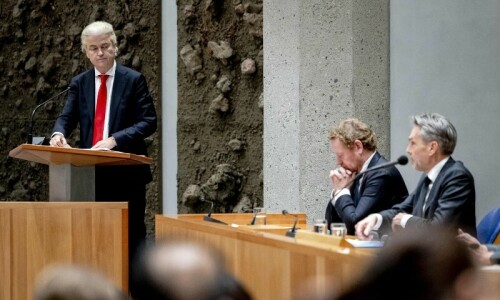IT was some 40 years ago that a string of revelations about monitoring his political adversaries, and then conspiring to cover up the White House-instigated operation, cost Richard Nixon his job as the president of the United States.
Watergate has long been deemed a watershed in US politics. In retrospect, though, it’s hard not to conclude that those were such innocent times.
In recent days, Nixon’s latest successor, Barack Obama, has been accused of considerably more serious transgressions by some of Washington’s closest allies on the international stage. His personal culpability in this context may not match that of Nixon, but everyone knows where the buck stops.
Last month, the leader of a nation broadly perceived as a US ally declared in the United Nations General Assembly: “Tampering in such a manner in the affairs of other countries is a breach of international law and is an affront to the principles that must guide the relations between them, especially among friendly nations … The right to safety of citizens of one country can never be guaranteed by violating the fundamental human rights of the citizens of another country.”
The righteous anger was voiced not by Chancellor Angela Merkel of Germany — although she would now surely concur — but by Dilma Rousseff, the president of Brazil, who was sufficiently incensed by revelations about the extent of US spying on her country’s political and commercial operations that she cancelled an official visit to Washington.
Merkel and the broader German political establishment were only moderately indignant over the initial revelations some months ago about the mass monitoring of communications in their country by the American National Security Agency (NSA). But the chancellor exploded when Der Spiegel revealed this month that even her personal mobile phone wasn’t off-limits for the American spooks.
A palpably incensed Merkel called up Obama and presumably gave him an earful. Friends do not spy on friends was the gist of her tirade, according to an official German statement.
A US press release says the president assured her that the US “is not monitoring and will not monitor” her communications. The obvious implication was that it had previously done so.
The Germans were sufficiently dissatisfied with the presidential apology to summon the US ambassador to the foreign ministry for a dressing-down. And Merkel could hardly have been thrilled with the further revelation that her private number had been on the NSA’s checklist since 2002, well before she became chancellor.
At a propitiously timed European Union summit last week, Germany and France — which has also been perturbed by reports of mass data mining — faced no opposition to the recommendation that the US must be challenged on this score.
Even David Cameron nodded along, despite being well aware that the British government is complicit in American eavesdropping operations.
Cameron has been less reticent about weighing in on the domestic debate on the issue, in which The Guardian, as the primary purveyor of the unpleasant truths revealed by NSA whistleblower Edward Snowden, has been accused of aiding the enemy and cited as a target for prosecution.
The venerable newspaper’s adversaries range from Conservative MPs and the right-wing press to representatives of the intelligence community, who allege that its reports about the methods employed by the Government Communications Headquarters (GCHQ) have persuaded terrorists and their sympathisers to seek out more secure modes of communication.
They may have had a more solid case had it been possible to point out that the NSA and the GCHQ were targeting only potential terrorist suspects. That is clearly not the case. This week, for example, the Spanish prime minister summoned the US ambassador to explain why 60 million phone calls in Spain had been monitored in the space of a month.
No one has so far come up with a satisfactory explanation for why targeting more or less everyone in various parts of the world is the ideal means of tracking terrorists.
There was a time when critiques of totalitarian states focused prominently on their tendencies towards mass surveillance. Western democracies were supposedly distinguished, inter alia, by their respect for individual privacy.
That was then. Was it 9/11 that changed everything? But then, to suggest that Al Qaeda prompted ostensible democracies to drift towards totalitarianism would be to imply that the terrorists succeeded at some level.
The ubiquity of mobile communications and the internet, meanwhile, have made mass monitoring that much simpler. Of course, landline phones could easily be tapped, and often were, just as snail mail could be censored — but technological advances have made it all that much easier.
Perhaps one of the reasons why the popular outcry in the face of the NSA revelations hasn’t been much greater in the US and elsewhere is that most people do not harbour the illusion that their mobile/internet communications are safe from prying eyes. Yet there’s the question of national pride. At two levels.
Merkel’s wrath can in part be accounted for by the sheer embarrassment of being spied upon by her nation’s closest ally — and innumerable other heads of state and government would presumably rather not know.
But this thought must have crossed her mind: what would be the repercussions had it turned out that the communications of millions of Americans, including the president, were being monitored by, say, Germany? Would Obama have satisfied himself with a phone call to Merkel and by castigating the German ambassador?
It boils down to American exceptionalism. True, a moderately chastened Obama has set inquiries in motion, and a number of prominent Americans, including Senate intelligence committee chair Dianne Feinstein, have questioned the extent of US activities.
Can much be expected to change, though? Well, as Nixon discovered, what ultimately counts is the risk of being found out. More elaborate and foolproof cover-ups will likely ensue.
mahir.dawn@gmail.com









































